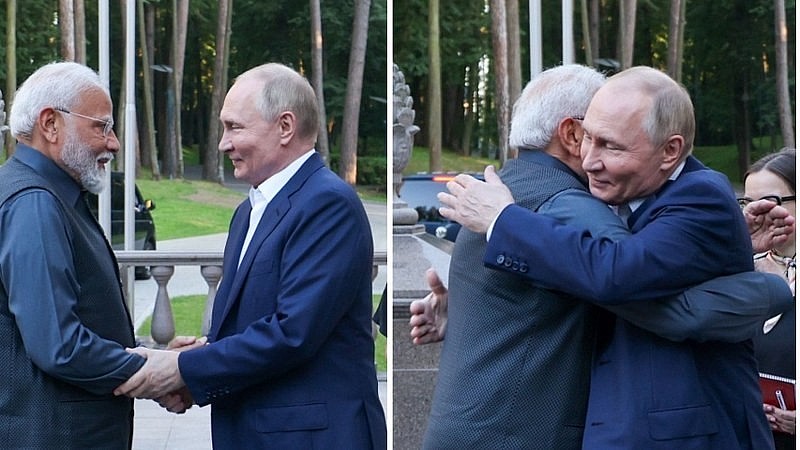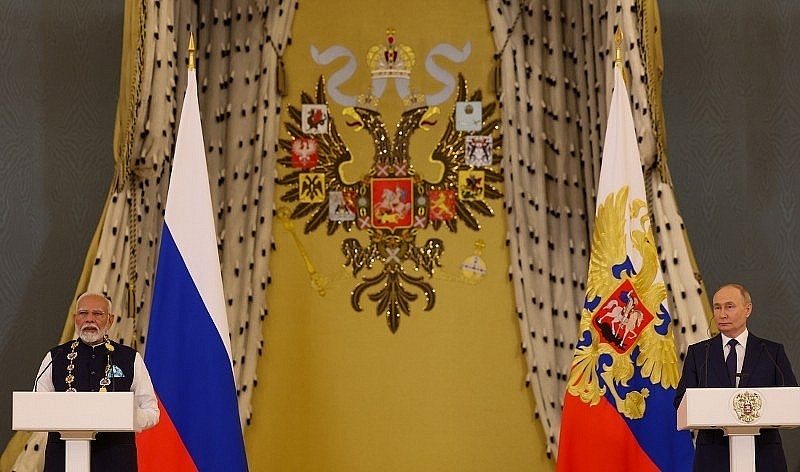India-Russia Relations: A Resilient Partnership in a Shifting Global Landscape
 |
The warm welcome Modi received, including a personal tour of President Vladimir Putin's residence and their signature bear hug, symbolized the deep-rooted connection between these two nations that has withstood the test of time and geopolitical shifts. The India-Russia relationship, often described as a "special and privileged strategic partnership," has its roots in the Cold War era when the Soviet Union was a key ally and primary arms supplier to India.
This relationship has demonstrated remarkable resilience, adapting to major global changes including the dissolution of the Soviet Union and India's increasing alignment with the West.
At the core of this enduring partnership lies a multifaceted cooperation spanning defense, energy, technology, and geopolitical strategy. Russia continues to be a crucial source of military hardware for India, the world's largest weapons importer.
The recent announcement by Rostec, the Russian state-owned arms giant, to manufacture armor-piercing tank rounds in India exemplifies the depth and evolving nature of this defense cooperation. This collaboration not only ensures India's military preparedness but also aligns with its "Make in India" initiative, promoting domestic defense manufacturing.
In the energy sector, India has dramatically increased its import of Russian crude oil, with figures skyrocketing from $2.5 billion in 2021 to an astounding $46.5 billion in 2023. This surge, occurring despite Western sanctions on Russia following its invasion of Ukraine, highlights India's pragmatic approach to securing its energy needs.
As a rapidly growing economy with burgeoning energy demands, India has leveraged this opportunity to access discounted oil, thereby managing its energy costs and inflation.
 |
The technological collaboration between India and Russia continues to expand, particularly in the realms of nuclear energy and space technology. Rosatom, Russia's State Atomic Energy Corporation, is currently in negotiations to construct six new nuclear power reactors in India.
This initiative addresses India's growing energy demands while also showcasing the trust and long-term vision shared by both nations in sensitive technological domains.
Geopolitically, the India-Russia relationship serves as a strategic counterbalance in an increasingly complex world order. For India, maintaining strong ties with Russia provides a counterweight to China's growing influence in the region. Similarly, Russia values its relationship with India as a means to avoid over-dependence on China, especially in light of Western sanctions that have pushed Moscow closer to Beijing.
Modi's recent visit to Moscow resulted in several significant developments that point towards a further strengthening of bilateral ties. Both countries announced an ambitious goal to increase annual trade volumes to $100 billion by 2030, a substantial increase from current levels. This target reflects the mutual desire to diversify and deepen economic engagement beyond traditional sectors.
Long-term agreements on oil and gas supplies were signed during the visit, ensuring India's energy security while providing Russia with a stable market for its resources. These agreements are particularly crucial for Russia, as they offer an economic lifeline in the face of Western sanctions.
The visit also saw the signing of an MoU between India's National Centre for Polar and Ocean Research and Russia's Arctic and Antarctic Research Institute. This agreement facilitates joint research in polar regions, an area of increasing global importance due to climate change and potential resource exploration.
In a move to enhance people-to-people connections, Modi announced the opening of new Indian consulates in Kazan and Yekaterinburg. This expansion of diplomatic presence aims to strengthen cultural ties and facilitate easier travel and business interactions between the two nations. However, India's strengthening relationship with Russia is not without its challenges and critics.
The United States and other Western nations have expressed concerns over India's close ties with Russia, particularly in light of the ongoing conflict in Ukraine. The U.S. State Department spokesman, Matthew Miller, explicitly stated America's concerns about the India-Russia relationship during a press briefing, highlighting the diplomatic tightrope India must walk.
The timing of Modi's visit also drew sharp criticism from Ukrainian President Volodymyr Zelensky. Coinciding with a Russian missile strike on a children's hospital in Kyiv, Zelensky described Modi's visit as "a huge disappointment and a devastating blow to peace efforts." This incident underscores the complex geopolitical environment India must navigate as it maintains its strategic autonomy. India's approach to its relationship with Russia demonstrates a delicate balancing act in its foreign policy.
While deepening ties with the United States and other Western powers, India continues to assert its strategic autonomy by maintaining its historically close relationship with Russia. This balancing act was evident in Modi's indirect criticism of the hospital attack in Kyiv during his meeting with Putin, where he stressed the importance of dialogue to end the conflict in Ukraine.
The economic dimension of the India-Russia relationship has become increasingly significant. Russia has emerged as India's largest oil supplier, surpassing traditional Middle Eastern sources. This shift has provided India with discounted energy supplies crucial for its growing economy while offering Russia a significant market for its sanctioned oil exports.
However, the burgeoning trade relationship is not without its challenges. Indian officials have begun to voice concerns about the mounting trade deficit with Russia, highlighting the need for a more balanced economic partnership. Modi's request for the discharge of Indians serving in the Russian military during his visit demonstrates India's sensitivity to domestic concerns while maintaining cordial relations with Russia. This issue had become politically contentious in India after reports emerged of Indians being recruited to serve in the Russian military, possibly against their will.
As India continues to rise as a global power, its ability to navigate these complex relationships will be a key determinant of its international influence and strategic autonomy. The challenge for India moving forward will be to balance its ties with Russia against its growing relationship with the West, particularly the United States.
As global geopolitical tensions rise, India's strategic autonomy and its ability to maintain constructive relationships with seemingly opposing camps will be put to the test. The India-Russia relationship, as demonstrated by Modi's recent visit, remains strong and multifaceted. It serves as a testament to the complexity of international relations in the 21st century, where historical ties, strategic interests, and economic considerations often trump ideological alignments. Despite growing ties with the West and international pressure due to Russia's actions in Ukraine, India continues to view its relationship with Russia as vital to its national interests.
This relationship, built on historical ties, strategic convergence, and mutual economic benefits, is likely to remain a key pillar of India's foreign policy. As both nations navigate an increasingly complex global landscape, their ability to maintain and strengthen their partnership will be crucial.
The resilience of this relationship in the face of changing global dynamics demonstrates its strategic importance to both countries. The India-Russia relationship stands as a unique example of international partnership in today's world. It showcases how countries can maintain strong bilateral ties despite differing relationships with other global powers.
As the world order continues to evolve, the ability of India and Russia to adapt their partnership to new realities while maintaining its core strength will be closely watched by global observers. This enduring relationship, rooted in history but focused on the future, will undoubtedly play a significant role in shaping the geopolitical landscape of the 21st century.
Recommended
 World
World
India reports 9 Pakistani Aircraft Destroyed In Operation Sindoor Strikes
 World
World
Thailand Positions Itself As a Global Wellness Destination
 World
World
Indonesia Accelerates Procedures to Join OECD
 World
World
South Korea elects Lee Jae-myung president
 World
World
22nd Shangri-La Dialogue: Japan, Philippines boost defence cooperation
 World
World
Pakistan NCRC report explores emerging child rights issues
 World
World
"India has right to defend herself against terror," says German Foreign Minister, endorses Op Sindoor
 World
World
